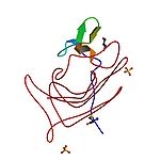
Haemophilia
Overview
Haemophilia is a group of hereditary
genetic disorder
s that impair the body's ability to control blood
clotting or coagulation
, which is used to stop bleeding when a blood vessel
is broken. Haemophilia A
(clotting factor VIII
deficiency) is the most common form of the disorder, present in about 1 in 5,000–10,000 male births. Haemophilia B
(factor IX
deficiency) occurs in around 1 in about 20,000–34,000 male births.
Like most recessive
sex-linked, X chromosome
disorders, haemophilia is more likely to occur in males than females.
Heredity
Heredity is the passing of traits to offspring . This is the process by which an offspring cell or organism acquires or becomes predisposed to the characteristics of its parent cell or organism. Through heredity, variations exhibited by individuals can accumulate and cause some species to evolve...
genetic disorder
Genetic disorder
A genetic disorder is an illness caused by abnormalities in genes or chromosomes, especially a condition that is present from before birth. Most genetic disorders are quite rare and affect one person in every several thousands or millions....
s that impair the body's ability to control blood
Blood
Blood is a specialized bodily fluid in animals that delivers necessary substances such as nutrients and oxygen to the cells and transports metabolic waste products away from those same cells....
clotting or coagulation
Coagulation
Coagulation is a complex process by which blood forms clots. It is an important part of hemostasis, the cessation of blood loss from a damaged vessel, wherein a damaged blood vessel wall is covered by a platelet and fibrin-containing clot to stop bleeding and begin repair of the damaged vessel...
, which is used to stop bleeding when a blood vessel
Blood vessel
The blood vessels are the part of the circulatory system that transports blood throughout the body. There are three major types of blood vessels: the arteries, which carry the blood away from the heart; the capillaries, which enable the actual exchange of water and chemicals between the blood and...
is broken. Haemophilia A
Haemophilia A
Haemophilia A is a deficiency in clotting factor VIII.Haemophilia A is inherited as an X-linked recessive trait, and thus occurs in males and in homozygous females. However, mild haemophilia A has been described in heterozygous females, presumably due to extremely unfavourable lyonization...
(clotting factor VIII
Factor VIII
Factor VIII is an essential blood clotting factor also known as anti-hemophilic factor . In humans, Factor VIII is encoded by the F8 gene...
deficiency) is the most common form of the disorder, present in about 1 in 5,000–10,000 male births. Haemophilia B
Haemophilia B
Haemophilia B is a blood clotting disorder caused by a mutation of the Factor IX gene, leading to a deficiency of Factor IX. It is the second most common form of haemophilia, rarer than haemophilia A. It is sometimes called Christmas disease after Stephen Christmas, the first patient described...
(factor IX
Factor IX
Factor IX is one of the serine proteases of the coagulation system; it belongs to peptidase family S1. Deficiency of this protein causes hemophilia B. It was discovered in 1952 after a young boy named Stephen Christmas was found to be lacking this exact factor, leading to...
deficiency) occurs in around 1 in about 20,000–34,000 male births.
Like most recessive
Recessive
In genetics, the term "recessive gene" refers to an allele that causes a phenotype that is only seen in a homozygous genotype and never in a heterozygous genotype. Every person has two copies of every gene on autosomal chromosomes, one from mother and one from father...
sex-linked, X chromosome
X chromosome
The X chromosome is one of the two sex-determining chromosomes in many animal species, including mammals and is common in both males and females. It is a part of the XY sex-determination system and X0 sex-determination system...
disorders, haemophilia is more likely to occur in males than females.

